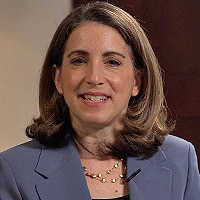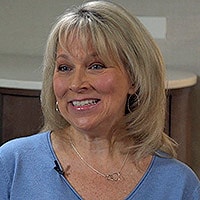Transcript
This transcript has been edited for clarity.
Erica Mayer, MD, MPH: Hello. I’m Dr Erica Mayer from Dana-Farber Cancer Institute in Boston. I’m a breast cancer medical oncologist, and I’m joined by one of my patients today, Lisa Doshier, who’s been under my care for at least the past 2 years. Hi, Lisa. Thank you so much for joining.
Lisa Scace Doshier: Hi, Dr Mayer. Thank you so much for having me here today. I’m thrilled to be here.
Mayer: So today for our Care Cues conversation, we’re going to be talking about strategies that doctors can use to communicate with patients, particularly in the setting of metastatic breast cancer. And in your situation, metastatic, hormone receptor–positive, human epidermal growth factor receptor 2–negative breast cancer. So, let’s jump in.
Doshier: Okay
Diagnosis: Let’s Not Panic
Mayer: We’re going to go back to about 2 years ago, and I want you to think about what it was like when you were first diagnosed with metastatic breast cancer, which is honestly a very scary and life-altering experience.
Doshier: Sure. I started with early stage 2, and that was in September of 2022, had a mastectomy, was on schedule for traditional chemotherapy and radiation, hoping that we’d never have to have this conversation. And, as a baseline, a CAT scan was performed, and spots were found in my lungs.
And that was the first step where you said, “Let’s not panic. Let’s take the next step.” That next step was a PET scan. There was mild glowing in that PET scan. [You said,] don’t worry. Let’s take the next step. That was a lung biopsy. Then the test results came back, confirming that the same cancer from the tumor that had been removed from my breast had spread to my lungs.
I received a notice in my email that my patient portal had been updated with lab results.
I waited for you to call. But then I didn’t wait for you to call. I read in my portal on Friday the 13th, “stage 4 metastatic breast cancer.” Then I did the worst thing I could ever do: I googled “metastatic breast cancer” and the first thing that popped up was “The average life expectancy post-diagnosis is two and a half years.”
It was 6:30 PM on a Friday night before a long holiday weekend and you called me, and you spent a lot of time on the phone with my husband and with me. And you explained to me that my cancer has changed. The diagnosis is different now, and what I have is no longer curable like we had originally thought with the early stage 2.
But it’s very manageable and it’s treatable. And you said women with metastatic breast cancer live many, many years. And I actually slept that night for the first time in weeks. I slept that night feeling like, okay, I can do this.
Mayer: I really appreciate how you describe the kind of emotional experience of learning this very important piece of information. And, also, that nowadays, sometimes these pieces of information reach you before they reach the provider team, and that it creates a difficult moment when you may know something without getting it discussed and digested with your providers.
Doshier: Right.
Mayer: I’m glad that we were able to keep that moment as short as possible.
Expert Opinion
Doshier: One of the main takeaways for me has been our communication. It has always been very open, very honest, and your form of communication is very calming for me. I know that I have a whole flight of stairs ahead of me, but we take it one step at a time, and you are right there by my side every time.
Mayer: I love how you describe that, and I also truly see it as a partnership.
Doshier: You had said to me, what questions do you have? And I said, how much time do I have? What do I tell my family? And you half chuckled, not in a way to discount me, but you said, what did you read?
But relying on you and your expertise and our conversation and our communication helped me to realize that what I read was old. I should not have googled it. I should not have read about that. I hit a panic button completely unnecessarily, and I’m so thrilled to say it was almost two and a half years ago.
Mayer: Yeah, it was. It’s hard not to do your own research. That’s the culture we live in nowadays. And I’m grateful that we can talk about “this is what I read, this is how I feel about it”. And I think that kind of back and forth is very important for me, and [it] also helps me understand what someone’s knowledge base is and how they’re affected by that.
Doshier: So many women who are breast cancer survivors reach out and give support, emotional support, physical support. But they’ve also had their horror stories. And, I remember, I had pages of questions for you. And you never discounted one of those experiences of the other women.
All you said was, that’s their path and you’ll be on your path, and I’ll be with you on your path. Those things may happen, they may not happen, but let’s just worry about your path.
Treatment Decisions
Mayer: Let’s talk about treatment a little bit. After you were diagnosed, we did a very comprehensive evaluation of the tumor tissue and determined that the best first step for us was to start medical treatment using a hormone medicine, letrozole, and a targeted medicine called ribociclib. How has it been?
Doshier: It has been fantastic. I’m very grateful for the dietician that I work with through Dana-Farber. She has helped me tremendously to put together a diet plan that makes the medications very tolerable. She has challenged me to put seven to eleven different colors of food on my plate each day.
And I feel fantastic because of that. Exercising has been a huge part of that as well. I used to exercise, but now I’m a lot more serious about it. And with the joint pain from the letrozole, I find the more I move, the better I feel. So, that helped a lot.
Mayer: At one point, we did need to adjust your dose a little bit.
Doshier: We did.
Mayer: Although ribociclib doesn’t tend to cause much day-to-day side effects, sometimes we see changes in the labs. And due to that, we had to adjust the dose.
Doshier: I have felt much better. However, that was a hard step for me. I felt like at that point on the staircase, we were going backwards. And I was very worried about the efficacy of a dose that was dialed back.
Mayer: We’re lucky in the breast cancer world to know that using slightly lower doses of medicines like ribociclib (or other similar medicines) doesn’t impact efficacy. We get just as much out of it.
Doshier: And I remember our communication, the conversation, when you said, let’s roll this back and then you wanted the next step: You will do scans in 3 months and after that it would be 6 months. And I thought I would burst into tears. You saw that I was nervous and said, we’ll go out 4 months and then we’ll talk about 4 months. It’s really okay. You need to trust the process.
And, scans, although they make me nervous — it’s a double-edged sword for me. I want them, but I don’t want them, at the same time.
Mayer: I tell patients: No matter what we see on the scan, we’re going to have a way to take care of it.
But if the scan says that we have to make a change, that’s when we reach into our toolbox and pick up a new tool. And the longer we push each line of therapy — because of the pace of breast cancer research — the more we have new tools being put into the toolbox, new FDA drug approvals, new treatment strategies, and new ways of assessing the cancer.
Diverse Concerns
Doshier: Dr Mayer, how does it work for you when you have a patient that maybe doesn’t follow your instructions and maybe doesn’t approach things in the same light that you would like them to?
Mayer: I think it’s a great question.
We take care of a very broad, diverse group of patients. What’s very important is for patients to really feel comfortable sharing what’s on their mind, whether it’s about their own health, their family’s reaction, their job, their finances, all the things that people can worry about, I want to know about it.
Part of what we try to do is, in a very holistic way, try to meet them where they are, to help provide the greatest support while also optimizing their cancer care as much as possible.
Sometimes it doesn’t happen at the first visit because you have to get to know each other and feel comfortable. But hopefully, over time, we get to know each other better, and people can share more and feel that it’s a safe space and a space where they can get the support they need.
Life and Cancer
Mayer: I’m curious if you could share with us a bit about how this diagnosis has affected your day-to-day and what you do with yourself.
Doshier: Sure. So, prior to my diagnosis, I was a licensed funeral director. The hours are unpredictable. They’re very long.
So, that career was not going to work for me anymore, and that was sad. But in my spare time, when I was a funeral director, I loved to take a spin class. And now I’m a spin instructor, and I teach spin class three times a week.
One woman, very early on in my diagnosis, gave me the best piece of advice. I hold on to it every day. She said, what cancer takes from you, make sure you take it back.
Things like: My favorite time of the year is the week between Christmas and New Year. And that year of 2022, I was at Dana-Farber three times having CAT scan, PET scan, and a lung biopsy. So, Christmas was a bust. And I mean that pun. Pun intended!
Doshier: But the following year, I was doing great. I felt fine. And I traded in my hospital gown for an evening gown, and we rang in the New Year with style. And on January 13, the 1-year anniversary of my advanced diagnosis, I taught my very first spin class. So, I took back January 13.
Mayer: I love that idea of being in a situation that can feel very out of control, but you identify the things that you can turn around and you can have some control over.
Well, Lisa, I just want to thank you so much for sharing so much insight and so much of your experience with me today. You’ve told us things that are deeply personal and incredibly inspiring. So, thank you.
Doshier: Well, thank you. I’m very grateful for our partnership and for everything that you’ve done for me. I’m honored to be here on many levels. So, thank you very much.







